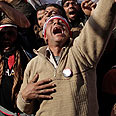
Egyptians protest at Tahrir Square
Photo: AP
During an interview about his latest film "After the Battle," Egyptian director Yousry Nasrallah was asked whether he was aware that it has been picked up for distribution in Israel,
Yedioth Ahronoth reported.
"I do not know at all if the film was sold to Israel," he replied "but if you want my opinion, no, I do not want it to be. Not as long as the Israelis still occupy the Palestinian territories," he said during a press conference in Cannes, as several journalists applauded.
Space Invaders
Shmulik Duvdevani
Wacky Finnish comedy 'Iron Sky' about Nazis plotting to attack planet Earth surprises filmgoers at 62nd annual Berlin International Film Festival. Israel's 'Sharqiya' also débuts
"After the Battle" takes places in post-revolution Egypt and has entered into the Cannes Film Festival official competition. It has recently been purchased for screening in Israel.
"A number of great Israeli directors are my friends, such as Avi Mograbi and Amos Gitai. But it's not me who decides whether the films should be sold to Israel or not," Nasrallah said.
"I don't think that while the Egyptians are still in their first stage moving towards liberation from their own regime, from oppression and military governance, Israel would be an ally in favor of such liberation," the 60-year-old filmmaker told the press conference.
Oded Horowitz, CEO of Israeli distribution company Orlando Films was surprised to learn of Nasrallah's comment. "I find it odd that a director whose film offers a very complex look at the outcomes of the current revolution in Egypt would respond this way," he told Yedioth Ahronoth.
"I purchased the film from its French production company and we intend to screen it in Israel soon. This will serve as further proof that Israeli society is much more diverse and open than it gets credit for."
"After the Battle" tells the story of two individuals at an impoverished area near the Pyramids after the popular uprising in Tahrir Square and the bond that is formed between them.
Nasrallah says he wanted to show the human aspect of the revolution and how normal people handle big events.
- Receive Ynetnews updates
directly to your desktop















